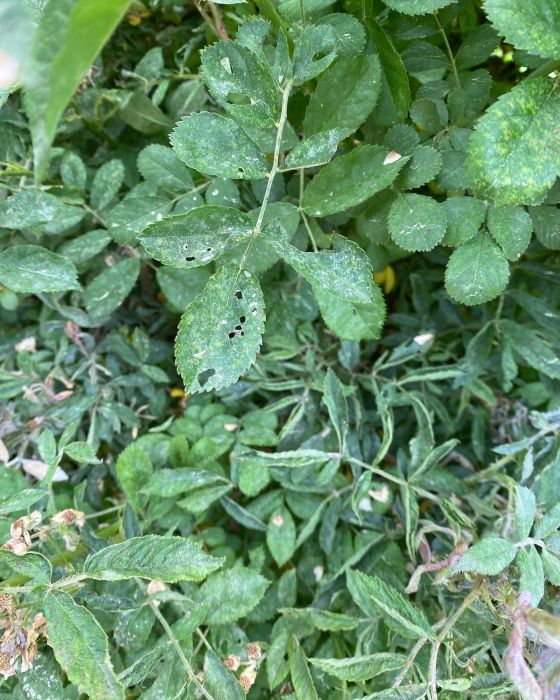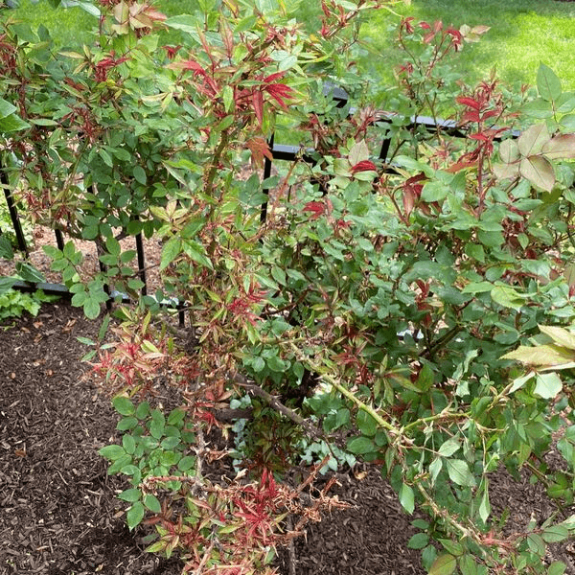Plant Health Care Issues for Roses
Roses are a popular plant choice for homeowners, representing beauty and elegance, gracing gardens and landscapes with vibrant colors and rich fragrances. However, these delicate flowers are also susceptible to various types of disease and pests that can compromise their health and appearance. We have treated rose plants at multiple residences this season, and below we discuss some of the common plant health care issues for roses, focusing on disease prevention and treatment methods to help you keep your roses thriving and disease-free.
Rose Diseases
Common rose diseases in Pennsylvania include powdery mildew, Botrytis blight, Rose Mosaic virus, Crown Gall, and stem canker. Some of these diseases are fungal infections, while others are viral.
Powdery Mildew
Powdery mildew is one of the most common foliar diseases of roses. The white, powdery fungal growth can be very disfiguring, with repeated heavy infection reducing plant vigor.
The powdery mildew fungus that affects roses is Podosphaera pannosa var. rosae, formerly known as Sphaerotheca pannosa.
Powdery mildew usually appears in spring or autumn when conditions are warm and humid, though plants can be affected at other times of year if conditions are right.
This a Rose bush we treated on a property for two common problems, including powdery mildew, that are relatively easy to identify. Powdery mildew is the cause of white and light grey spots on the leaves. The holes are caused by slug sawfly larva feeding on the leaves. Both will be treated and this rose will fully recover.


Rose Rosette
Rose rosette disease affects multiflora rose and ornamental Rosa genus plants., is caused by a virus (Emaravirus sp.) that is spread by a very small, eriophyid mite (Phyllocoptes fructiphylus). The mite feeds on the underside of leaves and injects saliva into the leaf tissue. The virus is then transmitted to new leaves when the mites move to new plants. They are wingless, but they can be carried on the wind or on clothing to new plants.
The symptoms of rose rosette appear as raised brown spots on new growth and on flowers. As the disease progresses, it causes deformation in the leaves and stems so that they resemble witches’ brooms.
Botrytis Blight
Botrytis blight is a fungal disease that is quite common in roses. Most common in cool, damp weather, the fungus infects the plant, causing gray spots on the leaves and petals. The fungus can also move to the cane, or stem of the rose plants.
Rose Mosaic Virus
Rose mosaic virus is a viral disease that causes yellowing and distortion of leaves. Aphids and thrips can transmit it. An important distinction between rose rosette and rose mosaic is that the rose rosette virus will kill the infected rose plants. Rose mosaic virus disease may cause symptoms such as slow growth, reduced flowers and increased susceptibility to frost for the entire life of the plant.
Crown Gall
Rose crown gall is a bacterial disease that causes tumor-like growths on the stems and roots of roses. Often considered a minor problem, it can cause considerable aesthetic damage to plants if left untreated.
Crown gall is caused by the bacterium Agrobacterium tumefaciens (AT) and is spread by infected plant material. The pathogen enters through wounds in the plant tissue, which may be caused by pruning, transplanting or other physical damage. Once inside, AT causes abnormal cell proliferation. This results in warty growths on the stem or root called galls.
Rose crown gall symptoms include the following:
- decreased blossoms
- formation of large, irregular swellings at ground level
- brown discoloration of affected stems
The disease can be spread by pruning equipment, or by galls breaking down in the soil. In the latter case, the pathogen can survive up to 3 years.
Cankers
Cankers are caused by a variety of fungi. These diseases cause reddish brown spots on canes (stems) that become covered with tiny black dots. Cankers can eventually kill the cane, and can be spread through pruning equipment.
Preventing Health Issues For Roses
To prevent these diseases and other plant health care issues for roses, good cultural methods such as proper watering, pruning, fertilization, and soil care are vital. Additionally, organic or chemical control methods, such as fungicides and horticultural oils, can protect your roses from diseases.
Good Air Circulation
Proper air circulation is crucial for maintaining the health of your roses. Good air circulation helps prevent the growth of fungal diseases by reducing humidity around the plants. To achieve this, roses need to be spaced adequately, pruned regularly, and any weeds or debris that may obstruct airflow need to be removed. Research has shown that proper air circulation can significantly reduce the incidence of diseases like powdery mildew in roses.
Resistant Varieties
Some rose varieties are more resistant to certain types of disease and pests than others. Choosing resistant varieties can reduce the need for chemical treatments and make maintaining plant health more manageable. Recommended disease-resistant rose varieties include ‘Knock Out,’ ‘Carefree Beauty,’ and ‘New Dawn,’ among others.
Early Spring Care
In early spring, roses need to be pruned to remove dead or diseased wood, fertilized with a slow-release fertilizer, and a dormant oil should be applied to control pests. Proper pruning is essential, as homeowners run the risk of wounding their plants by not making careful, precise cuts.
As an example, the best way to prevent crown gall is to avoid wounding plants when pruning or transplanting them.
Applications
- Fungicides can be an effective tool for preventing and treating rose diseases. Botrytis blight, for example, can be treated with a fungicide spray, but it should be done as early as possible, before the fungus has had time to spread. An important note is that fungicides must be applied carefully to avoid resistance development.
- Insecticides or horticultural oils can be useful to help control pests, such as aphids, and disease. Viral diseases like the rose mosaic virus can be controlled by systemic insecticides containing antibiotics to prevent infestation of aphids and thrips.
Contact Burkholder PHC for Plant Health Care Issues for Roses
If you want to keep your roses vibrant and maintain other healthy plants on your property, contact Burkholder PHC for more information or to schedule a consultation. Burkholder PHC has a team of experienced, qualified experts that can help homeowners maintain the health and appearance of their roses and other plant life. With years of experience in the field, our team knows how to treat plant health care issues for roses and high value landscape plants.

